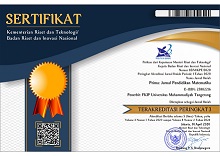PRE-SERVICE MATHEMATICS TEACHERS’ ALGEBRAIC THINKING IN SOLVING MATHEMATICS PROBLEMS BASED ON ADVERSITY QUOTIENT
Abstract
Keywords
Full Text:
PDFReferences
Amalliyah, N., Wardono, W., & Mulyono, M. (2022). Analisis Kemampuan Berpikir Aljabar Siswa ditinjau dari Adversity Quotient. Vygotsky:Jurnal Pendidikan Matematika Dan Matematika, 4(1), 1–12. https://doi.org/10.30736/voj.v4i1.420
Amir, M. Z., Nurdin, E., Azmi, M. P., & Andrian, D. (2021). The Increasing of Math Adversity Quotient in Mathematics Cooperative Learning through Metacognitive. International Journal of Instruction, 14(4), 841–856.
Badawi, A., Richmad, & Agoestanto, A. (2016). Analisis Kemampuan Berpikir Aljabar dalam Matematika pada Siswa SMP Kelas VIII. Unnes Journal of Mathematics Education (UJME), 5(3), 182–189.
Blanton, M. L., & Kaput, J. J. (2011). Functional Thinking as a Route Into Algebra in the Elementary Grades. 5–23.
Brown, R. ., & Herbert, K. (2020). Patterns as Tools for Algebraic Reasoning. Teaching Children Mathematic, 3(6), 340–344.
Hodnik Čadež, T., & Manfreda Kolar, V. (2015). Comparison of types of generalizations and problem-solving schemas used to solve a mathematical problem. Educational Studies in Mathematics, 89(2), 283–306. https://doi.org/10.1007/s10649-015-9598-y
Juwita, R. H., Roemintoyo, R., & Usodo, B. (2020). The Role of Adversity Quotient in the Field of Education: A Review of the Literature on Educational Development. International Journal of Educational Methodology, 6(3), 507–515. https://doi.org/10.12973/ijem.6.3.507
Kieran, C. (2004). Algebraic Thinking in the Early Grades : What Is It? Mathematics Educator, 8(1), 139–151.
Kriegler, S. (2007). Just What is Algebraic Thinking? Mathematics Educator, 8(1), 1–11.
Lew, H.-C. (2004). Developing Algebraic Thinking in Early Grades: Case Study of Korean Elementary School Mathematics. The Mathematics Educator, 8(1), 88–106.
Lingga, A., & Sari, W. (2013). Mathematics Education Learning and Teaching. Eduma: Mathematics Education Learning and Teaching, 2(2), 1–5.
Listiawati, N., & Sebayang, S. K. (2019). the Association Between Sociodemographic Factors and Teachers’ Guidance Towards Students’ Adversity Quotient. International Journal of Education, 11(2), 109. https://doi.org/10.17509/ije.v11i2.15341
Marpaung, Y. (2007). Karakteristik PMRI (Pendidikan Matematika Realistik Indonesia). Journal on Mathematics Education, 1(1), 1–10.
Masfingatin, T., & Murtafi’ah, W. (2016). Kemampuan Berpikir Logis Mahasiswa dengan Adversity Quotient Tipe Climber dalam Pemecahan Masalah Geometri. Jurnal Math Educator Nusantara, 2(1), 19–29.
Nahrowi, N., Susanto, & Hobri. (2020). The profile of student’s creative thinking skills in mathematics problem solving in terms of adversity quotient. Journal of Physics: Conference Series, 1465(1). https://doi.org/10.1088/1742-6596/1465/1/012064
OECD. (2013). PISA 2012 Released Mathematics Items. In OECD Publishing.
Paridjo. (2018). Kemampuan berpikir aljabar mahasiswa dalam materi trigonometri ditinjau dari latar belakang sekolah melalui pembelajaran berbasis masalah. PRISMA, Prosiding Seminar Nasional Matematika, 1(1), 814–829.
Pebriana, Kamid, & Hariyadi, B. (2019). Proses Berpikir Ilmiah Siswa Tipe Climber Dalam Pemecahan Masalah Biologi Di SMA. Edu-Sains Volume, 8(2), 33–41.
Rahayu, N., & Alyani, F. (2020). Kemampuan Berpikir Kritis Matematis Ditinjau Dari Adversity Quotient. Prima: Jurnal Pendidikan Matematika, 4(2), 121. https://doi.org/10.31000/prima.v4i2.2668
Sanit, I. N., Subanji, & Sulandra, I. M. (2019). Profil Penalaran Aljabaris Siswa Dalam Memecahkan Masalah Matematika Ditinjau dari Adversity Quotient. Jurnal Pendidikan Matematika, 4(9), 1213–1221. https://doi.org/10.26740/mathedunesa.v10n3.p490-496
Stoltz, P. G. (1997). Adversity Quotient: Turning Obstacles into Opportunities. In The Business Source. https://doi.org/10.1016/s0166-4972(00)00010-9
Sukmaningrum, R., & Kurniasari, I. (2022). Profile of student’s algebraic thinking in solving mathematics problems reviewing from adversity quotient. Jurnal Pijar Mipa, 17(2), 252–259. https://doi.org/10.29303/jpm.v17i2.3349
Suryadi, B., & Santoso, T. I. (2017). Self-Efficacy, Adversity Quotient, and Students’ Achievement in Mathematics. International Education Studies, 10(10), 12–19.
van Amerom, B. (2002). Reinvention of early algebra. In Developmental research on the transition from arithmetic to algebra.
DOI: http://dx.doi.org/10.31000/prima.v7i2.8714
Article Metrics
Abstract - 1242 PDF - 742Refbacks
- There are currently no refbacks.
Prima: Jurnal Pendidikan Matematika
Program Studi Pendidikan Matematika
Fakultas Keguruan dan Ilmu Pendidikan
Universitas Muhammadiyah Tangerang
Jl. Perintis Kemerdekaan I/33, Cikokol
Kota Tangerang, Indonesia
e-mail: primajpm@gmail.com
Prima: Jurnal Pendidikan Matematika (p-ISSN: 2579-9827 | e-ISSN: 2580-2216) is licensed under a Creative Commons Attribution 4.0 International License.







